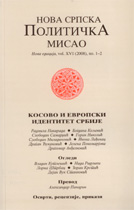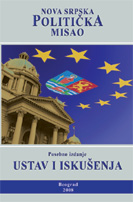| NSPM in English | |||
Council Conclusions on Western Balkans |
 |
 |
 |
| понедељак, 28. јануар 2008. | |
|
EXTERNAL RELATIONS Council meeting Brussels, 28 January 2008 The Council adopted the following conclusions: "Serbia The Council agreed on the text of the invitation at annex." Visa facilitation and readmission agreements The Council welcomed the entry into force of the visa facilitation and readmission agreements with Albania, Bosnia and Herzegovina, Montenegro, Serbia and the former Yugoslav Republic of Macedonia on 1 January 2008. They will foster more people-to-people contacts and increase the economic ties between the EU and the region. Recalling its conclusions of 10 December 2007, the Council also welcomed the intention of the European Commission to launch soon a visa dialogue with all the countries in the region and expressed its readiness to further discuss this issue, based on the Commission's forthcoming Communication on the Western Balkans, with a view to define detailed roadmaps setting clear benchmarks to be met by all the countries in the region in order to gradually advance towards visa liberalisation. This would enable the Council and the Commission to closely monitor progress in necessary reforms. ANNEX Invitation of the European Union to Sign a Political Agreement on Co-operation with Serbia The European Union proposes a Political Agreement on co-operation between the European Union and Serbia , providing a framework for making progress on political dialogue, free trade, visa liberalisation, and educational co-operation, to be signed on 7 February 2008. Serbia has a crucial role to play in the Western Balkans, both for ensuring stability and as a motor for the economic development and prosperity of the region. The European Union wishes to eepen its relationship with Serbia , which draws on a rich and diverse range of cultural, historic, economic and people to people ties. In this context the European Union offers Serbia to intensify political co-operation with a view to accelerating Serbia 's progress towards the EU, including candidate status. The Serbian people are part of the European family. A deepening relationship between the European Union and Serbia, leading to membership, will bring concrete benefits to the people of Serbia, in particular through stimulating economic progress, commercial relations by developing a free trade area, and people to people contacts, including in particular students. The European Union will continue to reach out to the people of Serbia and recognises the importance of making it easier for Serbians to travel in the European Union. To this end the Commission will start a dialogue on visa liberalisation. To underline their shared commitment to deepening the relationship among their peoples, the European Union agrees to take rapid steps towards increasing the number of Serbian students who study in the EU, both through the ERASMUS Mundus programme and bilateral initiatives. In this context the European Union will urgently examine ways of increasing the funding available. The Stabilisation and Association process remains the right vehicle to take forward this relationship. The European Union is committed to sign a Stabilisation and Association Agreement as soon as the necessary steps have been finalised. The European Union remains convinced of the benefits that the SAA will bring to both sides and of the positive effects this will have for the region as well. In this context the EU is committed to: - support the efforts of Serbia to strengthen democracy and the rule of law; - contribute to political, economic and institutional stability in Serbia; - provide a framework for political dialogue, allowing the development of close political relations; - support the efforts of Serbia to develop its economic and international co-operation, including through helping Serbia prepare its laws for eventual EU membership, including integration into the EU's single market; - support Serbia 's efforts to complete its transition into a functioning market economy; - develop a free trade area between the Community and Serbia; - and foster regional co-operation. - With a view to achieving this, the European Union agrees to set up a Task Force to examine ways of delivering rapid progress. The work of the Task Force will start immediately with a view to formulating recommendations to Serbia and the Council of the European Union as quickly as possible. We have agreed to stay in close contact with a view to furthering this process." |
Од истог аутора
Остали чланци у рубрици
- Playing With Fire in Ukraine
- Kosovo as a res extra commercium and the alchemy of colonization
- The Balkans XX years after NATO aggression: the case of the Republic of Srpska – past, present and future
- Из архиве - Remarks Before the Foreign Affairs Committee of the European Parliament
- Dysfunction in the Balkans - Can the Post-Yugoslav Settlement Survive?
- Serbia’s latest would-be savior is a modernizer, a strongman - or both
- Why the Ukraine Crisis Is the West’s Fault
- The Ghosts of World War I Circle over Ukraine
- Nato's action plan in Ukraine is right out of Dr Strangelove
- Why Yanukovych Said No to Europe

.jpg)





















